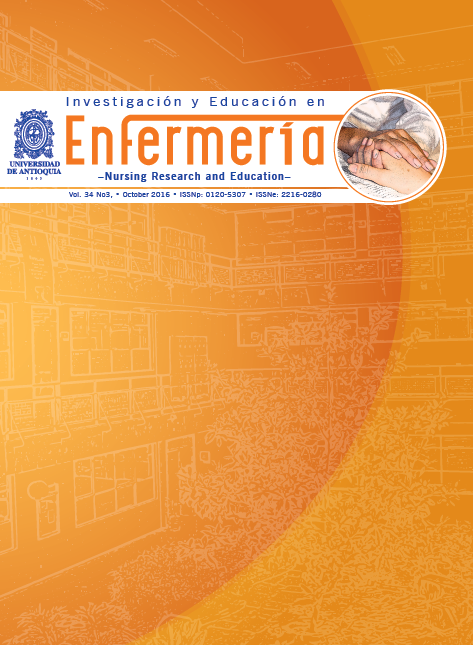Representation and participation in management committees of teaching and service integration
DOI:
https://doi.org/10.17533/udea.iee.325701Keywords:
Staff development, health systems, higher education policy, professional associations, health personnel management, nursing.Abstract
Objective. To analyze the representation and participation of the management, attention, teaching and social control segments in management committees of health teaching-service integration.
Methods. Qualitative research with exploratory-analytical approach that involved representatives of these segments who participate in the management instances of the Pro-Health integrated proposal of Chapecó, Santa Catarina, Brazil. The data was collected through semi-structured interviews with 11 members of the segments and observation of six meetings of instances between October 2012 and April 2013.
Results. The following categories emerged: Representation through dialogue: possibility to negotiate; Legitimacy of representation: establishing fecund relationships; Disparity in the representation of the segments: the four-way approach in disharmony.
Conclusion. It is incipient participation of some segments; there are different understandings as to the perception of the meaning of representation. There are conflicts, but the dialogue prevails, provided that the subjects need improve their communication skills.
How to cite this article: Vendruscolo C, Prado ML, Kleba, ME, Matos, IB. Representation and participation in management committees of teaching and service integration. Invest. Educ. Enferm. 2016; 34(3): 474-482
Downloads
References
(1) Ministério da Saúde, Ministério da Educação (BR). Programa Nacional de Reorientação da Formação Profissional em Saúde (Pró-Saúde): objetivos, implementação e desenvolvimento potencial. Brasília (DF): MS, MEC; 2007.
(2) Freire P. Pedagogia do oprimido. 41st ed. Rio de Janeiro: Paz e Terra; 2005.
(3) Silva MAM. et al. O Pró-Saúde e o incentivo à inclusão de espaços diferenciados de aprendizagem nos cursos de odontologia no Brasil. Interface comun. Saúde Educ. Botucatu. 2012; 16(42):707-17.
(4) Moriais, FRR, Leite IDR, Oliveira LL, Véras RM. A reorientação do ensino e da prática de enfermagem: implantação do Pró-Saúde em Mossoró, Brasil. Rev. Gaúcha Enferm. 2010; 31(3): 442-9.
(5) Ceccim RB, Feuerwerker LMC. O Quadrilátero da Formação para a Área da Saúde: Ensino, Gestão, Atenção e Controle Social. Physis: Rev. Saúde Coletiva, Rio de Janeiro. 2004; 14(1):41-65.
(6) Yin RK. Estudo de caso: planejamento e métodos. 4th ed. Porto Alegre: Bookman; 2010.
(7) Minayo MCS. O desafio do conhecimento: pesquisa qualitativa em saúde. 12nd ed. São Paulo: Hucitec; 2010.
(8) Ministério da Saúde (BR), Conselho Nacional de Saúde, Comissão Nacional de Ética em Pesquisa. Resolução No 446 de 12 de dezembro 2012: diretrizes e normas regulamentadoras de pesquisa envolvendo seres humanos. Brasília (DF): MS; 2012.
(9) Freire P. Política e educação. 8th ed. São Paulo: Villa das Letras; 2007.
(10) Zitkodki JJ (Org.). Dicionário Paulo Freire. Belo Horizonte: Autêntica; 2008.
(11) Menegaz JC, Backes VMS. Education for the unified health system: what do good professors do from the perspective of students?? Invest. Educ. Enferm. 2015; 33(3):500-8.
(12) Abers RN, Keck ME. Representando a Diversidade: estado, sociedade e “relações fecundas” nos conselhos gestores. Caderno CRH. 2008;21(52):99-112.
(13) Freire P. Pedagogia da autonomia: saberes necessários à prática educativa.43rd ed. São Paulo: Paz e Terra; 2009.
Downloads
Published
How to Cite
Issue
Section
License
Derechos de propiedad / Direitos de Propriedade
English: If the article is accepted for publication, all copyright will be of exclusive property of Investigación y Educación en Enfermería. The text and the graphics included in the publication are exclusive responsibility of the authors and not necessarily reflect the thought of the Editorial Committee.
Español: Si el artículo es aprobado para publicación, todos los derechos son de propiedad de Investigación y Educación en Enfermería. El texto y las gráficas incluidas en la publicación son de exclusiva responsabilidad de los autores y no necesariamente refleja el pensamiento del Comité Editorial.
Português: Se o artigo for aceito para publicação, todos os direitos autorais serão de propriedade exclusiva de Investigación y Educación en Enfermería. O texto e os gráficos incluídos na publicação são de responsabilidade exclusiva dos autores e não refletem necessariamente o pensamento do Comitê Editorial.















